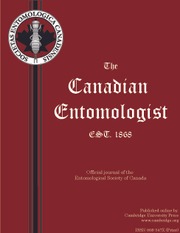Article contents
Cross-contamination is a risk associated with short-term insect specimen storage
Published online by Cambridge University Press: 19 November 2020
Abstract
Molecular analyses of DNA samples necessitate careful attention to experimental protocols to prevent contamination of samples during the specimen collection and DNA extraction, amplification, and visualisation stages. When these studies involve insects that are collected in the field, standard procedures require samples to be individually sorted and stored in single tubes to prevent cross-contamination of DNA between specimens. This additional step can be time consuming and impractical when the survey population is large. The focus of our study was to experimentally determine if this assumed contamination risk is valid and if it varies with storage conditions. To test this, we co-stored a single intact fruit fly (Drosophilia melanogaster) (Diptera: Drosophilidae) known to be infected with the bacterial endosymbiont Wolbachia (Anaplasmataceae) with uninfected flies in tubes for three-hour, 24-hour, and one-week durations. For each treatment time, replicates of five tubes contained one infected fly and either one or five uninfected flies (1:1 and 1:5 ratios). Overall, eight of 30 tubes had contamination regardless of storage duration, and storing samples in crowded (1:5 ratio) conditions significantly increased the risk of Wolbachia DNA transference. Our results suggest that researchers should make efforts to sample and store specimens individually if cross-contamination is a concern in molecular analyses.
- Type
- Scientific Notes
- Information
- Copyright
- © The Author(s), 2020. Published by Cambridge University Press on behalf of the Entomological Society of Canada
Footnotes
Subject Editor: Dezene Huber
References
- 1
- Cited by



